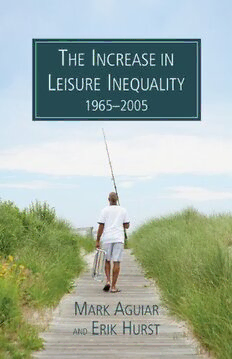Download The Increase in Leisure Inequality, 1965-2005 PDF Free - Full Version
Download The Increase in Leisure Inequality, 1965-2005 by Mark Aguiar, Erik Hurst in PDF format completely FREE. No registration required, no payment needed. Get instant access to this valuable resource on PDFdrive.to!
About The Increase in Leisure Inequality, 1965-2005
Recent research documents increasing income inequality in the United States--in particular, a widening gap between well-educated and less-educated American workers. But income is not the sole measure of prosperity. The amount of time Americans spend in leisure is also crucial to our understanding of American well-being, changes in well-being over time, and differences in well-being among citizens. This meticulously-researched monograph examines trends in leisure inequality to present a more complete picture of prosperity in America. Using data spanning forty years and tens of thousands of survey respondents, Mark Aguiar and Erik Hurst seek to answer several key questions about leisure inequality: How much has the leisure time of the average American increased or decreased over the last several decades? What increases or decreases in leisure time are seen across groups with different levels of education, and to what extent do educational differences in employment status account for these changes? That is, if workers with relatively little education are less likely to be employed today than twenty years ago, does that explain an increase in their leisure relative to more-educated workers? Aguiar and Hurst find that the leisure time of the average American has risen by about four hours per week since the mid-1960s. Moreover, the leisure gap between the less educated and more educated has widened, as leisure time has increased by eight hours for Americans without a high school diploma and decreased by six hours for college-educated Americans. What accounts for this puzzling divergence? Understanding the forces that drive increasing leisure inequality could have important implications for American employment policy.
Detailed Information
| Author: | Mark Aguiar, Erik Hurst |
|---|---|
| Publication Year: | 2009 |
| ISBN: | 9780844743134 |
| Pages: | 86 |
| Language: | English |
| File Size: | 0.25 |
| Format: | |
| Price: | FREE |
Safe & Secure Download - No registration required
Why Choose PDFdrive for Your Free The Increase in Leisure Inequality, 1965-2005 Download?
- 100% Free: No hidden fees or subscriptions required for one book every day.
- No Registration: Immediate access is available without creating accounts for one book every day.
- Safe and Secure: Clean downloads without malware or viruses
- Multiple Formats: PDF, MOBI, Mpub,... optimized for all devices
- Educational Resource: Supporting knowledge sharing and learning
Frequently Asked Questions
Is it really free to download The Increase in Leisure Inequality, 1965-2005 PDF?
Yes, on https://PDFdrive.to you can download The Increase in Leisure Inequality, 1965-2005 by Mark Aguiar, Erik Hurst completely free. We don't require any payment, subscription, or registration to access this PDF file. For 3 books every day.
How can I read The Increase in Leisure Inequality, 1965-2005 on my mobile device?
After downloading The Increase in Leisure Inequality, 1965-2005 PDF, you can open it with any PDF reader app on your phone or tablet. We recommend using Adobe Acrobat Reader, Apple Books, or Google Play Books for the best reading experience.
Is this the full version of The Increase in Leisure Inequality, 1965-2005?
Yes, this is the complete PDF version of The Increase in Leisure Inequality, 1965-2005 by Mark Aguiar, Erik Hurst. You will be able to read the entire content as in the printed version without missing any pages.
Is it legal to download The Increase in Leisure Inequality, 1965-2005 PDF for free?
https://PDFdrive.to provides links to free educational resources available online. We do not store any files on our servers. Please be aware of copyright laws in your country before downloading.
The materials shared are intended for research, educational, and personal use in accordance with fair use principles.

